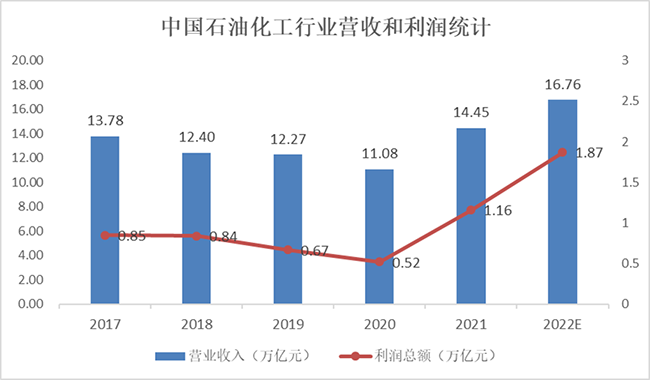

Homepage > CMRC understandings > 【CMRC understanding】China's petrochemical industry is facing challenges under the "double carbon" situation
Hits:4795 Createtime:2022-07-28 11:04:13
After the goal of "China will improve its national independent contribution, adopt more powerful policies and measures, strive to peak carbon dioxide emissions by 2030, and strive to achieve carbon neutralization by 2060", China's carbon neutralization path research and development is in full swing, which has a great impact on the future industrial development trend. The petrochemical industry is one of the six high energy consuming industries in China. According to the statistical data from the domestic petroleum and Chemical Industry Planning Institute, the carbon dioxide emitted by the petrochemical industry in the production process accounts for about 13% of the total national carbon emissions, and about 17% of the total carbon emissions in the industrial field. In addition, products produced from fossil raw materials extend carbon emissions to the field of end consumption. In terms of total emissions, the petrochemical industry is not the first to bear the brunt, but in terms of emission intensity, the carbon emission per unit income of the petrochemical industry is higher than the average level of the industrial industry; Under the dual control of carbon emissions and carbon emission intensity by the state, the petrochemical industry is facing the shackles of carbon reduction.
Petrochemical industry is an important pillar industry of China's national economy, with wide product coverage, capital and technology intensive, high industrial relevance, and complex production and processing processes from crude oil to chemical raw materials to chemical products. Under the continuous guidance of national policies, China's petrochemical industry has made great progress, and the output of major products is rising. From 2015 to 2019, the total output of oil and gas and the total output of major chemicals in China continued to rise. In 2019, the total national oil and gas production reached 347million tons (oil equivalent), an increase of 4.7% year-on-year; The total output of major chemicals increased by about 4.6% to 625million tons. By the end of 2020, there were 26039 Enterprises above Designated Size in the domestic petroleum and chemical industry, including 365 enterprises in the oil and gas exploitation sector, 1357 enterprises in the oil refining sector (biomass fuel), 22973 enterprises in the chemical sector (including coal chemical industry) and 1344 enterprises in the special equipment sector; Industry assets totaled 13.82 trillion, an increase of 5.0%; The total operating revenue of the industry was 11.08 trillion yuan, a year-on-year decrease of 8.7%.
In 2020, China imported 542million tons of crude oil, accounting for 73.5% of the national oil consumption, with a year-on-year increase of 7.3%. It is estimated that in 2021, the apparent consumption of crude oil will increase by about 5% over the previous year, that of natural gas will increase by about 7%, that of refined oil will increase by about 5%, that of chemical fertilizer will increase by about 1%, that of synthetic materials will increase by about 8%, that of basic chemical raw materials will increase by about 5%, and that of ethylene will increase by about 4.5%.

From the above data, China's demand for petroleum products continues to grow; At the same time, the problems of high material consumption and high energy consumption still exist in the petrochemical industry. In view of higher environmental protection requirements and the rapid development of chemical processes, relying on technological innovation will become an important means to promote the green development of chemical transformation and upgrading.
The proposal of the "double carbon" target will lead the petrochemical industry into an unprecedented era, and the competition pattern of the global petrochemical industry will also undergo major changes. Under the trend of world energy reform and industrial development, the petrochemical industry can achieve high-quality and high-efficiency development only by actively responding to the challenges it faces, deeply studying and judging the development trend of carbon peak and carbon neutrality at home and abroad, and seeking transformation and reform.